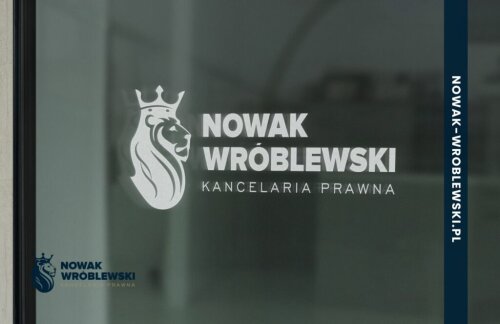Best Appeal Lawyers in Tarnobrzeg
Share your needs with us, get contacted by law firms.
Free. Takes 2 min.
List of the best lawyers in Tarnobrzeg, Poland
1. About Appeal Law in Tarnobrzeg, Poland
Appeal law in Tarnobrzeg covers reviews of court decisions by higher courts. In Poland, an appeal (apelacja) challenges judgments issued by courts at first instance. The goal is to correct errors of law or misapplication of facts rather than re‑argue the entire case.
In Tarnobrzeg, most appeal proceedings arise from decisions of the local district court (sąd rejonowy) or regional court (sąd okręgowy) within the Podkarpackie region. Appellate reviews are heard by higher courts in the regional chain, typically in the Court of Appeal or the regional appellate structure serving the Podkarpackie voivodship. Practicing attorneys in Tarnobrzeg will file and argue appeals in Polish and handle procedural formalities such as deadlines, grounds of appeal, and submission of supporting documents.
Two key professional roles commonly involved are adwokat (advocate) and radca prawny (legal counsel). In Poland, these lawyers represent clients in appellate courts and guide them through complex procedural rules. Local counsel in Tarnobrzeg can coordinate with national or regional appellate bodies as required by the case type.
Kasacja is a separate remedy to the Supreme Court on points of law, not a re‑examination of facts. It is available in limited circumstances after an appeal has been decided.
Recent trends in Polish appeal practice include greater use of electronic communications and online filing platforms for appellate submissions, which can affect timelines and documentation requirements. For authoritative guidance on current rules, consult official sources such as the Internetowy System Aktów Prawnych (ISAP) and the Supreme Court’s resources.
Sources you can consult for the official texts and current practice include ISAP and the Supreme Court’s pages. These provide the consolidated texts and explanations of how appeals are processed in Poland.
Source: ISAP - Internetowy System Aktów Prawnych and Sąd Najwyższy (Supreme Court) guidance
Small note for Tarnobrzeg residents: local courts and appellate procedures can be highly technical. A qualified attorney familiar with the Podkarpackie circuit can tailor strategies to your specific facts, deadlines, and relevant local court practices.
Key fact: The appellate process in Tarnobrzeg follows the national framework for appeals in civil and criminal matters, with regional appellate channels handling the review and potential escalation to cassation on points of law.
2. Why You May Need a Lawyer
Here are concrete scenarios where residents of Tarnobrzeg typically seek appeal legal help, with real‑world context:
- You disagree with a civil judgment issued by a Tarnobrzeg district court and want to challenge the decision at the next level. A lawyer can prepare the grounds of appeal and present legal arguments effectively.
- Your employer or a business client faces a court ruling affecting debt, contract obligations, or commercial disputes. An advocate will assess whether the decision involved misapplication of law or misinterpretation of contract terms and file the appeal within deadlines.
- A spouse or partner dispute resolved in Tarnobrzeg's family or civil division requires grounds for reconsideration. An attorney can identify grounds for appeal and coordinate with other jurisdictions if necessary.
- You need to pause enforcement of a judgment while the appeal is pending. A solicitor can seek temporary measures or suspensions and navigate collateral consequences.
- You suspect the trial court misapplied evidence or failed to consider key facts. A legal counsel can challenge evidentiary rulings and preserve appellate rights.
- You face a criminal conviction from a Tarnobrzeg court and want to contest the verdict on points of law or new legal grounds. An attorney with experience in appellate criminal procedure can guide you through the process.
3. Local Laws Overview
The appeal process in Tarnobrzeg is governed by core national statutes and procedural codes. Here are the primary laws you should know:
- Kodeks postępowania cywilnego (Code of Civil Procedure) - Governs civil appeals, including who may appeal, grounds for appeal, and procedural steps. This code applies to judgments issued by civil courts, including those in Tarnobrzeg. It is regularly amended to reflect changes in court practice and electronic filing. Current consolidated text available on official government databases.
- Kodeks postępowania karnego (Code of Criminal Procedure) - Governs criminal appeals, including remedies against final criminal judgments and procedural steps for appeals in Tarnobrzeg and surrounding courts. It defines appeals, cassation options, and timelines. Current consolidated text available on official government databases.
- Ustawa o kosztach sądowych w sprawach cywilnych (Act on Court Costs in Civil Matters) - Controls court fees for civil proceedings, including appeal filings. It sets fee amounts and when they are due, which affects Tarnobrzeg residents appealing civil decisions. Current text and amendments available on ISAP.
Recent changes in Poland emphasize digital access and electronic submissions for appellate cases. The government has been rolling out standardized electronic filing and case‑management tools, which impact how appeals are initiated and tracked in Tarnobrzeg. For the most up‑to‑date details, consult official sources such as ISAP and the Ministry of Justice guidance.
Sources for official texts and current practice:
Current civil and criminal procedure rules and court‑cost provisions are published by ISAP and the Supreme Court. See ISAP and Sąd Najwyższy for formal guidance.
4. Frequently Asked Questions
The following questions cover common concerns about appeals in Tarnobrzeg, with practical answers you can use when speaking with a lawyer.
What is appeal law in Tarnobrzeg in simple terms?
An appeal asks a higher court to review a court decision for legal or factual errors. The higher court can overturn, modify, or confirm the original judgment.
How do I file an appeal from Tarnobrzeg court?
Typically you file a written appeal with the court that issued the judgment. You must meet the deadline stated in the judgment or by law, usually in writing and in Polish. A lawyer can prepare the grounds and file electronically where available.
When can I appeal a judgment in Tarnobrzeg?
Appeals are generally possible after a final judgment in civil or criminal cases. Deadlines depend on the case type and the court’s ruling, so confirm with a local attorney.
Where do I file an appeal from Tarnobrzeg court?
Appeals are filed with the court that issued the judgment, or to the appropriate higher court in the Podkarpackie circuit. Your lawyer will determine the exact filing destination.
Why should I hire a local Tarnobrzeg lawyer for an appeal?
Local lawyers know the court’s procedures and judges in the Tarnobrzeg area. They can tailor arguments to the regional practice and ensure timely filings.
Can I represent myself in an appeal in Tarnobrzeg?
You may represent yourself, but complex appeal procedures and formal requirements often benefit from professional representation to avoid errors.
Should I attach new evidence in an appeal?
New evidence is typically limited in appeals. A lawyer can advise whether new evidence is admissible and how to present it within legal rules.
Do I need to pay court fees for appealing?
Yes. Court costs apply to filing an appeal and related proceedings. A lawyer can estimate fees and discuss possible exemptions or reductions.
How long does an appeal usually take in Tarnobrzeg?
Timelines vary by case complexity and court calendars. Civil appeals often take several months to over a year; criminal appeals may follow a similar range depending on issues raised.
Is there a difference between civil and criminal appeals in Tarnobrzeg?
Yes. Civil appeals focus on contract, property, and family issues, while criminal appeals address verdicts, penalties, and admissibility of evidence. Different procedural rules apply.
What is kasacja and when would I use it?
Kasacja is a remedy to the Supreme Court on points of law after an appeal fails or is unsuitable. It does not re‑examine facts.
Can I appeal an administrative decision from Tarnobrzeg local authorities?
Yes, but administrative decisions may be reviewed by different courts (administrative courts) and under separate procedures. A lawyer can determine the appropriate path.
5. Additional Resources
Useful official sources and organizations for Appeal in Poland and Tarnobrzeg:
- ISAP - Internetowy System Aktów Prawnych - Official database of Polish legal acts, including the Code of Civil Procedure, Code of Criminal Procedure, and court‑cost statutes. https://isap.sejm.gov.pl
- Sąd Najwyższy (Supreme Court) - Official information on cassation and points of law. https://www.sn.pl
- Naczelna Rada Adwokacka - Polish Bar Association; guidance on finding and engaging a lawyer (adwokat). https://www.adwokatura.pl
Additional government resources may be found on the official Gov.pl portal for civil and criminal justice information. https://www.gov.pl
6. Next Steps
- Identify your appeal type by confirming whether your case is civil or criminal and the court that issued the verdict in Tarnobrzeg. Allocate 1-2 weeks for this step.
- Obtain the judgment and any related documents, including deadlines and grounds of decision. Gather all relevant contracts, evidence, and notices. Allow 1-2 weeks.
- Consult a Tarnobrzeg‑based lawyer (adwokat or radca prawny) who handles appeals. Schedule an initial consultation to discuss viability of an appeal. Plan 1-2 weeks for this step.
- Have the lawyer assess deadlines, grounds of appeal, and potential for an expedited review. Confirm required documents and whether electronic filing is available. 1 week for review.
- Decide on filing the appeal and any requests for provisional measures such as stay or suspension of execution. Prepare formal grounds and submit with the court. 2-4 weeks for filing depending on the court.
- Engage in the appellate process, respond to any responses from the other party, and monitor the progress of the case. This is an ongoing process that may take multiple months.
- Prepare for possible further steps, including cassation options if the appeal outcome is unfavorable and your lawyer deems it appropriate. Timeline depends on the case stage and court calendars.
Lawzana helps you find the best lawyers and law firms in Tarnobrzeg through a curated and pre-screened list of qualified legal professionals. Our platform offers rankings and detailed profiles of attorneys and law firms, allowing you to compare based on practice areas, including Appeal, experience, and client feedback.
Each profile includes a description of the firm's areas of practice, client reviews, team members and partners, year of establishment, spoken languages, office locations, contact information, social media presence, and any published articles or resources. Most firms on our platform speak English and are experienced in both local and international legal matters.
Get a quote from top-rated law firms in Tarnobrzeg, Poland — quickly, securely, and without unnecessary hassle.
Disclaimer:
The information provided on this page is for general informational purposes only and does not constitute legal advice. While we strive to ensure the accuracy and relevance of the content, legal information may change over time, and interpretations of the law can vary. You should always consult with a qualified legal professional for advice specific to your situation.
We disclaim all liability for actions taken or not taken based on the content of this page. If you believe any information is incorrect or outdated, please contact us, and we will review and update it where appropriate.










